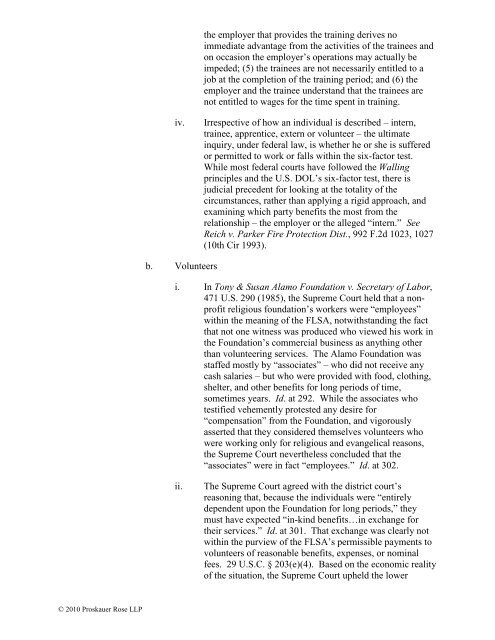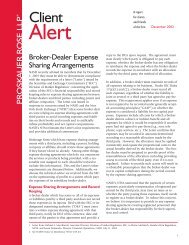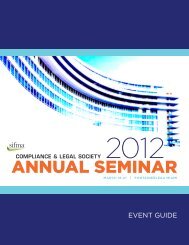Misclassification of Workers - Proskauer Rose LLP
Misclassification of Workers - Proskauer Rose LLP
Misclassification of Workers - Proskauer Rose LLP
Create successful ePaper yourself
Turn your PDF publications into a flip-book with our unique Google optimized e-Paper software.
© 2010 <strong>Proskauer</strong> <strong>Rose</strong> <strong>LLP</strong><br />
the employer that provides the training derives no<br />
immediate advantage from the activities <strong>of</strong> the trainees and<br />
on occasion the employer’s operations may actually be<br />
impeded; (5) the trainees are not necessarily entitled to a<br />
job at the completion <strong>of</strong> the training period; and (6) the<br />
employer and the trainee understand that the trainees are<br />
not entitled to wages for the time spent in training.<br />
iv. Irrespective <strong>of</strong> how an individual is described – intern,<br />
trainee, apprentice, extern or volunteer – the ultimate<br />
inquiry, under federal law, is whether he or she is suffered<br />
or permitted to work or falls within the six-factor test.<br />
While most federal courts have followed the Walling<br />
principles and the U.S. DOL’s six-factor test, there is<br />
judicial precedent for looking at the totality <strong>of</strong> the<br />
circumstances, rather than applying a rigid approach, and<br />
examining which party benefits the most from the<br />
relationship – the employer or the alleged “intern.” See<br />
Reich v. Parker Fire Protection Dist., 992 F.2d 1023, 1027<br />
(10th Cir 1993).<br />
b. Volunteers<br />
i. In Tony & Susan Alamo Foundation v. Secretary <strong>of</strong> Labor,<br />
471 U.S. 290 (1985), the Supreme Court held that a nonpr<strong>of</strong>it<br />
religious foundation’s workers were “employees”<br />
within the meaning <strong>of</strong> the FLSA, notwithstanding the fact<br />
that not one witness was produced who viewed his work in<br />
the Foundation’s commercial business as anything other<br />
than volunteering services. The Alamo Foundation was<br />
staffed mostly by “associates” – who did not receive any<br />
cash salaries – but who were provided with food, clothing,<br />
shelter, and other benefits for long periods <strong>of</strong> time,<br />
sometimes years. Id. at 292. While the associates who<br />
testified vehemently protested any desire for<br />
“compensation” from the Foundation, and vigorously<br />
asserted that they considered themselves volunteers who<br />
were working only for religious and evangelical reasons,<br />
the Supreme Court nevertheless concluded that the<br />
“associates” were in fact “employees.” Id. at 302.<br />
ii. The Supreme Court agreed with the district court’s<br />
reasoning that, because the individuals were “entirely<br />
dependent upon the Foundation for long periods,” they<br />
must have expected “in-kind benefits…in exchange for<br />
their services.” Id. at 301. That exchange was clearly not<br />
within the purview <strong>of</strong> the FLSA’s permissible payments to<br />
volunteers <strong>of</strong> reasonable benefits, expenses, or nominal<br />
fees. 29 U.S.C. § 203(e)(4). Based on the economic reality<br />
<strong>of</strong> the situation, the Supreme Court upheld the lower




